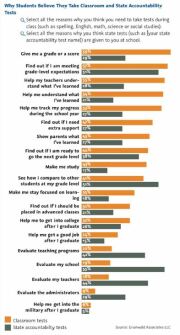A survey released Tuesday finds that teachers and administrators are looking more favorably than they did two years ago on the amount of time that teachers and students spend on test preparation and testing.
That’s one of the surprising findings in the Northwest Evaluation Association’s new study of educators’ attitudes toward assessment. While most teachers still think too much time is spent on testing, fewer think so than compared with 2011, the last time the Portland, Ore.-based testmaker did the survey. Two years later, more teachers think “just the right amount of time” is going into assessments. (In this question, the survey did not distinguish between classroom tests and year-end accountability tests.)

The trend is the same when the question is put to administrators, but the numbers are even more dramatic. Compared with the last set of NWEA findings, the number of administrators who say that students and teachers spend too much time involved with testing has dropped by double-digit percentages.

The study was based on 20-minute online surveys conducted last month with a nationally representative sample of 1,004 K-12 teachers, 200 administrators, and 1,040 students in grades 4-12.
Students turned in some surprising responses when asked about their experience with assessments, too. More than 90 percent—even at the high school level—agreed that tests are “very important” or “somewhat important” for a half-dozen purposes, including helping their teachers chart their progress, understanding what they’re learning, and setting goals for learning.

Think students don’t understand much about tests and how they’re used? Check out this next finding. They showed a striking ability to differentiate between what classroom tests are used for and what year-end state accountability tests are used for.

In another question in the survey, students, teachers, and administrators drew a distinction between classroom testing and end-of-year accountability tests, saying that they found classroom tests far more valuable. Seventy percent of teachers and 55 percent of administrators said that state tests take up too much time. When asked what kinds of supports or interventions accompanied weak results for the two kinds of tests, students reported that classroom tests were far more likely than state assessments to bring before- or after-school sessions, small-group support, or other extra help.
“Fifty-four percent of teachers and 89 percent of administrators said that the ideal focus of assessment should be frequently tracking student performance and providing daily or weekly feedback in the classroom,” the study says. Eighty-nine percent of students said that tests results aren’t very helpful to them or their teachers after more than one week.
Accordingly, one of NWEA’s policy recommendations, based on the survey results, is to reallocate federal, state, and district assessment spending on the kinds of tests that inform teaching and learning.
